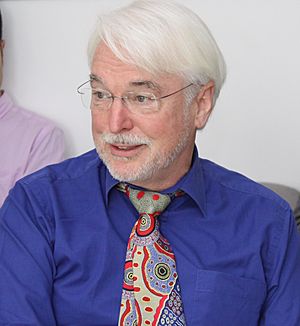Steve Rayner facts for kids
Quick facts for kids
Steve Rayner
|
|
|---|---|
 |
|
| Born | 22 May 1953 |
| Died | 17 January 2020 (aged 66) |
| Nationality | British |
| Known for | Climate change policy |
Steve Rayner (born May 22, 1953 – died January 17, 2020) was a smart and important professor at Oxford University. He was known for his work on how society and science connect. He called himself an "undisciplined social scientist" because he studied many different subjects. These included philosophy, religion, and how people organize themselves in groups.
One of his main interests was climate change. He looked at ways to deal with its effects, like adapting to new weather patterns. He also studied geoengineering, which involves big projects to change the Earth's climate. Professor Rayner was a strong critic of the Kyoto Protocol, an international agreement about climate change. He believed it wasn't the best way to solve the problem.
His paper, The Wrong Trousers: Radically Rethinking Climate Policy, was very important. He wrote it with Gwyn Prins from the London School of Economics. This paper suggested new ways to think about climate policy. Steve Rayner also studied "wicked problems" – these are tricky problems that are hard to solve. In 2008, Wired Magazine named him one of the top 15 people the US President should listen to. He was also recognized for his help with the Intergovernmental Panel on Climate Change (IPCC). The IPCC won the Nobel Peace Prize in 2007.
Contents
Understanding Climate Change Solutions
Steve Rayner was very interested in how people think about nature. He studied how these ideas influence our moral and political choices. He also wanted to use social science to make the world a better place.
His early research looked at how different groups of people organize themselves. He focused on how they dealt with environmental and health risks. He also studied the political side of climate change.
Key Ideas and Reports
Professor Rayner wrote or helped write over 175 published works. These included nine books. He also edited a series of books called "Science in Society." He helped edit a big study about how social science helps us understand climate change. He always pointed out problems with the main ways governments tried to deal with climate change.
In 2007, he released a report called The Wrong Trousers. This report said that the Framework Convention on Climate Change and the Kyoto Protocol were based on wrong ideas. He suggested that countries should invest a lot of money in new energy research and development.
Later, he wrote How to Get Climate Policy Back on Course. This was followed by The Hartwell Paper. These papers argued that the 2009 Copenhagen Climate Summit showed the Kyoto Protocol had failed. He said it "failed to produce any noticeable real world reductions in greenhouse gases in fifteen years."
Professor Rayner's later work looked at how science and government work together. He was concerned about trying to solve big disagreements only with science. He also worried about too much public involvement in some decisions. He focused on new technologies like geoengineering. He helped write an important report called Geoengineering the Climate. He also led the creation of the Oxford Principles for Geoengineering Governance. These principles guide how geoengineering should be managed.
He gave almost 150 talks about climate policy and how to manage risks. He spoke at many important events around the world.
His Early Career Journey
Before working at Oxford University, Steve Rayner was a professor at School of International and Public Affairs, Columbia University. There, he led a center focused on science, technology, and environmental policy. He also worked as a professor of sociology and as the chief social scientist at a climate prediction institute.
Before Columbia University, he was a chief scientist at the Pacific Northwest National Laboratory. He led a research group there from 1991 to 1996. Earlier, he was a deputy director at the Oak Ridge National Laboratory. In this role, he managed research on policy, energy, and human systems. During these years, he also taught at other universities like Cornell University and Boston University.
Awards and Groups He Joined
Steve Rayner was a Fellow at Keble College in Oxford. He was also an honorary professor at the University of Copenhagen. He was a Senior Fellow at the Breakthrough Institute, an environmental think-tank. He was part of a group of experts for the UK Government's plan for the future of cities.
He was a member of the Intergovernmental Panel on Climate Change (IPCC) for their Second, Third, and Fourth Assessment Reports. He also served on the Royal Commission on Environmental Pollution from 2003 to 2009. From 2002 to 2008, he directed a big research program called 'Science in Society'. He was a Fellow of several important groups, including the Royal Anthropological Institute and the American Association for the Advancement of Science. His work was featured in many famous newspapers and magazines, like The New York Times and Nature.
See also
- Criticism of the Kyoto Protocol
- Adaptation
- Climate engineering (geoengineering)
- Wicked problems
 | Selma Burke |
 | Pauline Powell Burns |
 | Frederick J. Brown |
 | Robert Blackburn |

